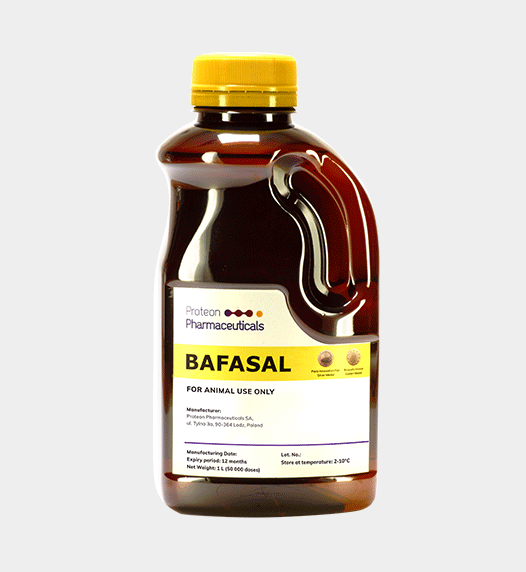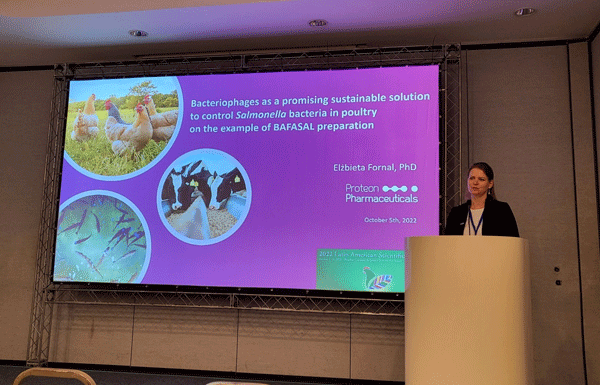Bacteriophages as a promising sustainable solution to control salmonella
Published: April 28, 2023
By: Ewelina Wójcik, Justyna Andrysiak, Justyna Kowalska, Elzbieta Fornal, Magdalena Walczak, Justyna Wojtasik-Malinowska, Malgorzata Stanczyk and Jaroslaw Dastych
During October 4th - 6th our Research & Development team participated in the 𝗟𝗮𝘁𝗶𝗻 𝗔𝗺𝗲𝗿𝗶𝗰𝗮𝗻 𝗦𝗰𝗶𝗲𝗻𝘁𝗶𝗳𝗶𝗰 𝗖𝗼𝗻𝗳𝗲𝗿𝗲𝗻𝗰𝗲 𝟮𝟬𝟮𝟮, which took place in Iguazú Falls, Paraná, Brazil. Our colleague Elżbieta Fornal presented the results of one of the recently conducted studies on the 𝗕𝗮𝗰𝘁𝗲𝗿𝗶𝗼𝗽𝗵𝗮𝗴𝗲𝘀 𝗮𝘀 𝗮 𝗽𝗿𝗼𝗺𝗶𝘀𝗶𝗻𝗴 𝘀𝘂𝘀𝘁𝗮𝗶𝗻𝗮𝗯𝗹𝗲 𝘀𝗼𝗹𝘂𝘁𝗶𝗼𝗻 𝘁𝗼 𝗰𝗼𝗻𝘁𝗿𝗼𝗹 𝗦𝗮𝗹𝗺𝗼𝗻𝗲𝗹𝗹𝗮 𝗯𝗮𝗰𝘁𝗲𝗿𝗶𝗮 𝗶𝗻 𝗽𝗼𝘂𝗹𝘁𝗿𝘆 𝗼𝗻 𝘁𝗵𝗲 𝗲𝘅𝗮𝗺𝗽𝗹𝗲 𝗼𝗳 𝗕𝗔𝗙𝗔𝗦𝗔𝗟® 𝗽𝗿𝗲𝗽𝗮𝗿𝗮𝘁𝗶𝗼𝗻.
𝗘𝘅𝘁𝗲𝗻𝘀𝗶𝘃𝗲 𝗮𝗽𝗽𝗹𝗶𝗰𝗮𝘁𝗶𝗼𝗻 𝗼𝗳 𝗮𝗻𝘁𝗶𝗯𝗶𝗼𝘁𝗶𝗰𝘀 𝗶𝗻 𝗮𝗻𝗶𝗺𝗮𝗹 𝗽𝗿𝗼𝗱𝘂𝗰𝘁𝗶𝗼𝗻 𝗰𝗿𝗲𝗮𝘁𝗲𝘀 𝗲𝗻𝘃𝗶𝗿𝗼𝗻𝗺𝗲𝗻𝘁𝗮𝗹 𝗮𝗻𝗱 𝗵𝘂𝗺𝗮𝗻 𝘀𝗮𝗳𝗲𝘁𝘆 𝗰𝗼𝗻𝗰𝗲𝗿𝗻𝘀 𝗱𝘂𝗲 𝘁𝗼 𝘁𝗵𝗲 𝗿𝗶𝘀𝗲 𝗼𝗳 𝗮𝗻𝘁𝗶𝗯𝗶𝗼𝘁𝗶𝗰 𝗿𝗲𝘀𝗶𝘀𝘁𝗮𝗻𝗰𝗲. This growing trend forces scientific community to urgent search for other solutions to protect animals against bacterial pathogens. Bacteriophages are promising alternative that can support the reduction of the unnecessary use of antibiotics. Here, we present BAFASAL®, a feed additive which is a mixture of carefully selected and patented bacteriophages, that helps control Salmonella on poultry farms.
BAFASAL® helps control Salmonella on poultry farms

The aim of this study was to investigate the efficacy of BAFASAL® in the prevention of Salmonella Enteritidis colonization and its influence on the performance of breeders and egg quality. In the study, 336 healthy 22-weeks old Ross 308 breeders were randomly allocated to 24 pens, at 12 breeding hens and 2 roosters per pen. Birds were distributed into 4 groups (6 replicates per each group):
T1 - negative control: no Salmonella infection,
T2 - positive control: Salmonella infection,
T3 - Salmonella infection, BAFASAL® HIGH dose (3 weeks on EOD/3 weeks off),
T4 - Salmonella infection, BAFASAL® LOW dose (3 weeks on EOD/3 weeks off).
During the 90 days study Salmonella presence was monitored and mortality, body weight, feed intake, water intake, feed conversion, laying rate, egg mass, fertility, hatchability, chick viability were evaluated. For statistical analyses 1-way ANOVA followed by Tukey post hoc was used (Statistica version 13.1).
Elżbieta Fornal, PhD presenting on 𝗟𝗮𝘁𝗶𝗻 𝗔𝗺𝗲𝗿𝗶𝗰𝗮𝗻 𝗦𝗰𝗶𝗲𝗻𝘁𝗶𝗳𝗶𝗰 𝗖𝗼𝗻𝗳𝗲𝗿𝗲𝗻𝗰𝗲 𝟮𝟬𝟮𝟮

Results: At day 90, number of Salmonella in feces of birds from T3 was reduced by more than 4.3 Log (P< 0.01), while for birds from T4 it was more than 3.4 Log (P< 0.05) in comparison to the group T2 not obtaining BAFASAL®. BAFASAL® significantly reduced the mortality of Salmonella-infected birds, showing the mortality rate in the range of 1.39-4.17%, which was similar to T1 (0%) and statistically lower than for T2 (19.44%). Weight gain, feed and water intake were within the breeder performance objectives of Ross 308 for all tested groups. Birds from group T2 had significantly lower egg laying rate than birds from groups T1, T3-T4, but egg composition was not influenced by infection. Fertility and hatchability of eggs from treated groups were higher than those of T2. What is more, BAFASAL® was proved to be effective in reducing the rate of Salmonella vertical transfer to eggs.
The conclusion:
This data suggest that the BAFASAL® feed additive has proven to be very efficient in prevention and reduction of Salmonella occurrence in gastrointestinal tract of breeders and may be successfully applied to prevent Salmonella infections in poultry breeders.
Related topics:
Authors:
Proteon Pharmaceuticals
Proteon Pharmaceuticals
Proteon Pharmaceuticals
Recommend
Comment
Share

Would you like to discuss another topic? Create a new post to engage with experts in the community.









.jpg&w=3840&q=75)